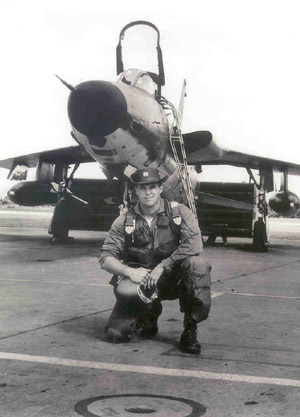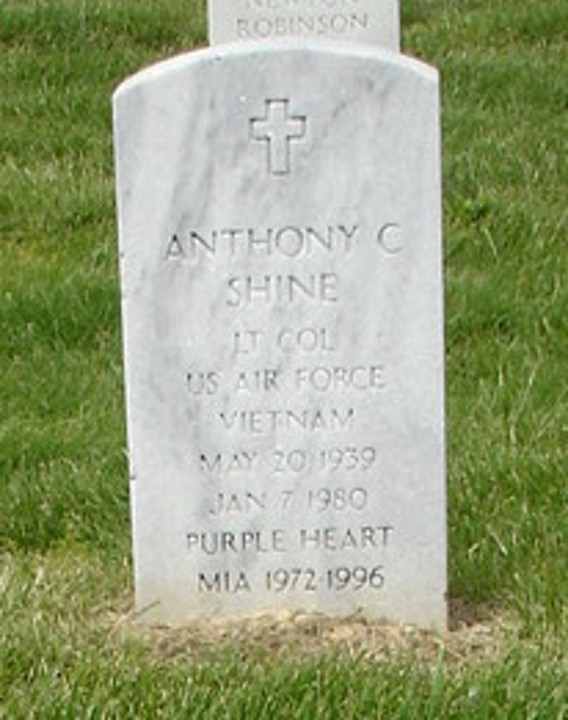From a comtemporary news report
Captain Anthony Shine was piloting his A-7D aircraft on a reconnaissance and escort mission December 2, 1972, near the border of Laos and North Vietnam when he radioed his wing man. Shine said he was descending below cloud cover for a closer look at their target area, a 10-mile stretch of road called Highway 7.
Ten minutes had passed when the wing man tried to radio Shine; there was no answer. Airborne Command and Control directed an extensive two-day airborne search. Rescue teams reported a fire on the ground, but no aircraft wreckage.
Almost 24 years later the serenity of Arlington National Cemetery was broken by the sharp report of rifle volleys followed by the haunting notes of “Taps.” Lieutenant Colonel Anthony C. Shine had come home to rest in honored glory.
In the peaceful skies above, four F-15 fighter aircraft executed the missing man formation while the Air Force Honor Guard folded the American flag over Shine’s casket.
The U.S. and Prisoner of War-Missing in Action flags rustled in the crisp fall breeze as Lieutenant General Lloyd W. Newton, Air Force Vice Chief of Staff, presented the flag to Shine’s wife, Bonnie Shine, and his mother Helen Shine. Family members and friends looked on as this hero was finally laid to rest.
Responsibility for bringing Shine home belonged in part to Joint Task Force Full Accounting at Camp H.M. Smith, Hawaii.
The task force, established in 1992, was created in response to presidential, congressional and public interest, as well as increased cooperation from the governments of Vietnam, Laos and Cambodia. JTF-FA has recovered the remains of more than 350 unaccounted-for Americans.
Investigators and analysts have conducted more than 2,100 case investigations and answered countless questions about many whose fate was previously unknown.
Shine’s remains were repatriated June 6, 1995. On Aug. 2, 1996, the Armed Forces Identification Review Board approved the identification of the remains as those of Anthony C. Shine.
The Shine family has remained active in POW-MIA issues. In 1980 Bonnie Shine established an award in honor of her husband and all missing in action from the Southeast Asia conflict.
The Anthony C. Shine Award is given each year to a fighter pilot for proficiency and professionalism in flying a fighter aircraft. The award will be presented this year in a special ceremony honoring Shine and his long-awaited homecoming.
Note: He was born on 20 May 1939 and entered the service from Pleasantville, New York. His tour of duty in Vietnam began on December 2, 1972 and was declared dead on January 8, 1980.
From a contemporary press report
I remember the first time I saw the White House was with the ‘President Carter, where’s my Daddy?’ picket sign in my hand,” said Colleen Shine.
Shine, who was 8 years old when her father disappeared over North Vietnam, found the answer to that question 24 years later. The answer came not from the White House, but through her own personal struggle.
Air Force Lieutenant Colonel Anthony Shine’s A-7 was downed without a trace on December 2, 1972, and for 14 years his family heard nothing.
Finally, in 1987, there were leads. Reports of a crash site, witnesses and a helmet started filtering back to the United States. The government discounted the new information, ignoring the helmet because the Pentagon said it had no identifiable markings.
Shine grasped the leads as the only link to her missing father.
In 1993, she went to Vietnam to conduct her own personal investigation. She rented a Russian jeep, hired a Vietnamese guide and set off toward the crash site.
After being told by the government that the site had been looted, Shine did not expect to find many clues about her father.
“I learned from our government that the crash site had been heavily scavenged by villagers and that there was nothing else to find there. As I started looking at the ground I started finding pieces of my father’s aircraft,” Shine recalled.
She later found the man who had her father’s helmet, which had her father’s name hand-written on the inside.
Shine’s findings gave the investigation new information, said James Wold, deputy assistant secretary for POW/MIA affairs.
A fuller probe of the site and a nearby grave yielded plane parts with serial numbers, a dog tag and remains with matching DNA.
Because of his daughter’s efforts, Lieutenant Colonel Shine was buried in October with full military honors at Arlington National Cemetery.
While his daughter is glad to know his fate, she believes her father could have been found much sooner.
Wold says the case illustrates the agency’s willingness to follow cases on a long-term basis, but Shine said the efforts to find her father were inadequate.
“I don’t know that I would say that there was a responsible, efficient effort to learn my father’s fate, on the part of the government,” Shine said.
Wold admits there may have been bureaucratic mistakes, but he insists that every attempt is made to correct glitches.
For her part, Shine says she is more concerned with letting go of the bitterness and anger toward the government that accompanied her search.
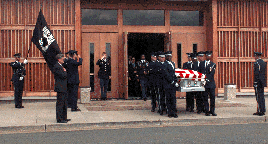
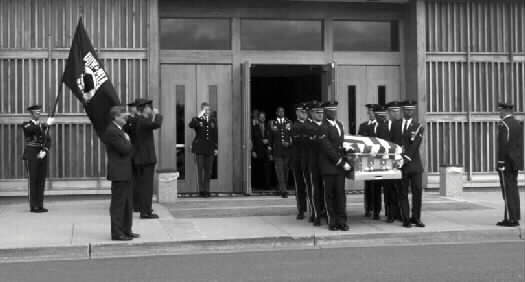
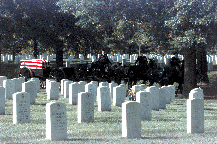
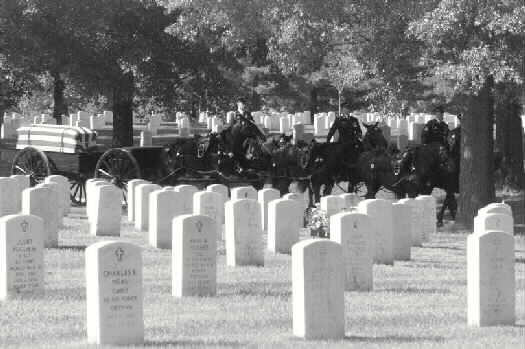
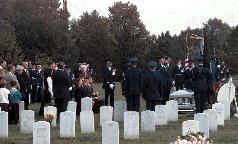
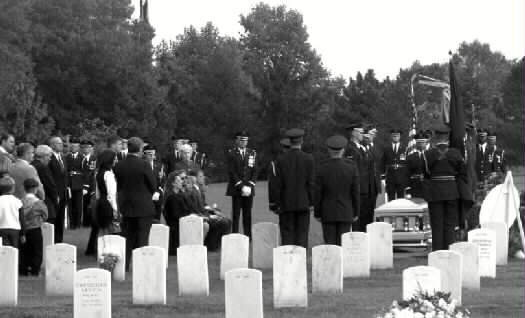
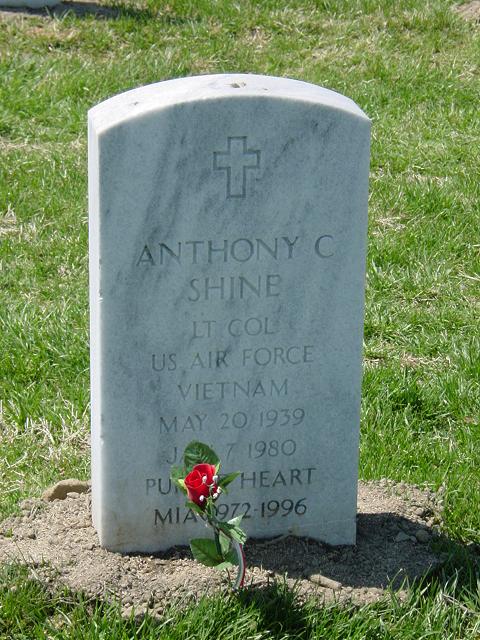
Michael Robert Patterson was born in Arlington and is the son of a former officer of the US Army. So it was no wonder that sooner or later his interests drew him to American history and especially to American military history. Many of his articles can be found on renowned portals like the New York Times, Washingtonpost or Wikipedia.
Reviewed by: Michael Howard


